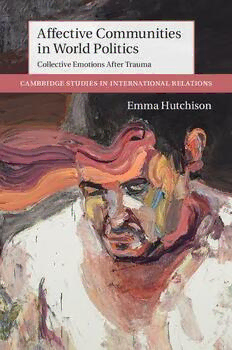
Affective Communities in World Politics: Collective Emotions after Trauma PDF
Preview Affective Communities in World Politics: Collective Emotions after Trauma
Affective Communities in World Politics Emotions underpin how political communities are formed and function. Nowhere is this more pronounced than in times of trauma. The emotions associated with suffering caused by war, terrorism, natural disasters, fam- ine and poverty can play a pivotal role in shaping communities and orien- tating their politics. But until recently the political roles of emotions have received only scant attention. This book contributes to burgeoning literatures on emotions and inter- national relations by investigating how “affective communities” emerge after trauma. Drawing on several case studies and an unusually broad set of interdisciplinary sources, the book examines the role played by rep- resentations – from media images to historical narratives and political speeches. Representations of traumatic events are crucial, the book argues, because they generate socially embedded emotional meanings, which, in turn, enable direct victims and distant witnesses to share the injury – as well as the associated loss – in a manner that affi rms a particular notion of collective identity. While ensuing political orders often re-establish old patterns, traumatic events can also generate new “emotional cultures” that genuinely transform national and transnational communities. Emma Hutchison is a R esearch Fellow in the School of Political Science and International Studies at the University of Queensland, Australia. Her work focuses on emotions and trauma in world politics, particularly in relation to security, humanitarianism and international aid. She has published widely on these and related topics in scholarly books and international journals, including I nternational Theory, International Political Sociology, Review of International Studies, and the E uropean Journal of Social Theory. CAMBRIDGE STUDIES IN INTERNATIONAL RELATIONS: 140 Affective Communities in World Politics EDITORS Christian Reus-Smit Nicholas J. Wheeler Evelyn Goh EDITORIAL BOARD James Der Derian, Theo Farrell, Martha Finnemore, Lene Hansen, Robert Keohane, Rachel Kerr, Jan Aart Scholte, Peter Vale, Kees van der Pijl, Jutta Weldes, Jennifer Welsh, William Wohlforth Cambridge Studies in International Relations is a joint initiative of Cambridge University Press and the British International Studies Association (BISA). The ser- ies aims to publish the best new scholarship in international studies, irrespective of subject matter, methodological approach or theoretical perspective. The series seeks to bring the latest theoretical work in International Relations to bear on the most important problems and issues in global politics. CAMBRIDGE STUDIES IN INTERNATIONAL RELATIONS 139 Patricia Owens Economy of force Counterinsurgency and the historical rise of the social 138 Ronald R. Krebs Narrative and the making of US national security 137 Andrew Phillips and J. C. Sharman International order in diversity War, trade and rule in the Indian Ocean 136 Ole Jacob Sending, Vincent Pouliot and Iver B. Neumann Diplomacy and the making of world politics 135 Barry Buzan and George Lawson The global transformation History, modernity and the making of international relations 134 Heather Elko McKibben State strategies in international bargaining Play by the rules or change them? 133 Janina Dill Legitimate targets? Social construction, international law, and US bombing 132 Nuno P. Monteiro Theory of unipolar politics 131 Jonathan D. Caverley Democratic militarism Voting, wealth, and war 130 David Jason Karp Responsibility for human rights Transnational corporations in imperfect states 129 Friedrich Kratochwil The status of law in world society Meditations on the role and rule of law Series list continues after index Affective Communities in World Politics Collective Emotions after Trauma Emma Hutchison University Printing House, Cambridge CB2 8BS, United Kingdom Cambridge University Press is part of the University of Cambridge. It furthers the University’s mission by disseminating knowledge in the pursuit of education, learning and research at the highest international levels of excellence. www.cambridge.org Information on this title: www.cambridge.org/9781107095014 © Emma Hutchison 2016 This publication is in copyright. Subject to statutory exception and to the provisions of relevant collective licensing agreements, no reproduction of any part may take place without the written permission of Cambridge University Press. First published 2016 Printed in Milton Keynes by Lightning Source UK Ltd A catalogue record for this publication is available from the British Library Library of Congress Cataloguing in Publication data Names: Hutchison, Emma, 1980– author. Title: Affective communities in world politics : collective emotions after trauma / Emma Hutchison, the University of Queensland. Description: New York : Cambridge University Press, 2016. | Series: Cambridge studies in international relations ; 140 | Includes bibliographical references and index. Identifiers: LCCN 2015042957 | ISBN 9781107095014 (hardback) Subjects: LCSH: Political psychology. | Emotions – Political aspects. | Psychic trauma – Political aspects. | Group identity – Political aspects. | International relations – Psychological aspects. | BISAC: POLITICAL SCIENCE / International Relations / General. Classification: LCC JA74.5.H86 2016 | DDC 327.101/9–dc23 LC record available at http://lccn.loc.gov/2015042957 ISBN 978-1-107-09501-4 Hardback Cambridge University Press has no responsibility for the persistence or accuracy of URLs for external or third-party internet websites referred to in this publication, and does not guarantee that any content on such websites is, or will remain, accurate or appropriate. For my family
